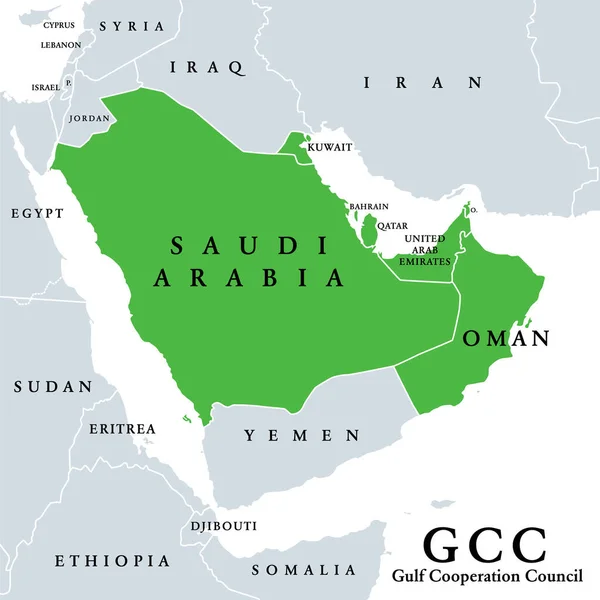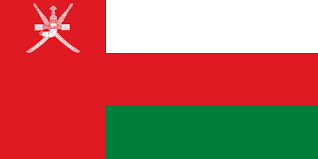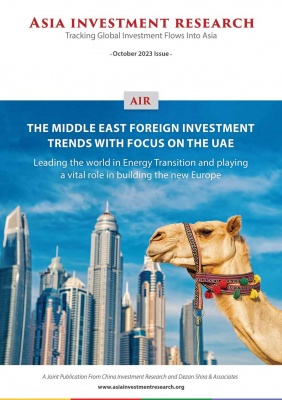Germany’s trade with the GCC, 2023/24 Status and Prospects
By Farzad Ramezani Bonesh
Variables from the First World War, the Second World War, and the reunification of Germany, have all influenced the view and approach of German foreign policy towards the GCC in the 20th century.
Olaf Schulz’s appointment as Germany’s chancellor in December 2021, the Ukraine conflict, and the Israel-Palestine situation in the Middle East have all had very recent impact on Berlin’s geopolitical view of the Middle East. Germany’s foreign policy is in the framework of the European Union. But with the uncertainty of the future of the international system, Germany’s partial reliance on the United States, Europe’s leadership not always in in line with its national interests, America’s withdrawal from the Middle East, increasing global tensions, and increasing expectations of Germany’s increased role, all mean that Berlin has been paying more attention to the GCC, and especially in energy and trade diversification matters.
In fact, Germany’s foreign policy is made up of economic interests and further economic growth in line with Germany’s national interests. Countries that have more potential for economic interaction are more important than others.
Germany is currently one of the main trading partners of the GCC, and accessing its markets is important to support Germany’s export-oriented economy.
In an increasingly multipolar world, Germany is adjusting its relations with the GCC beyond energy, and apart from participating in some military exercises in supporting freedom of navigation, Germany has always been one of the top arms exporters to the GCC.
Previously, Germany’s economic interaction with the GCC was mostly due to non-energy exports in the manufacturing, infrastructure, or service sectors. However, Germany has entered into new energy partnerships with the GCC to diversify its energy supply.
The developments of the last two years in the global energy market and the outbreak of the Ukraine conflict has caused Berlin to pay more attention to imports and investments in the energy sector, and its diversifying components. Sustainable access to sustainable energy is one of Germany’s main needs in interaction with GCC partners.
Therefore, despite the large reserves of oil and natural gas in the GCC, Berlin is looking for the stability of global energy markets and ensuring energy security, diversifying energy routes, and
reducing its dependence on energy contracts and greater interaction with players such as Qatar, the UAE, and Saudi Arabia.
In September 2022, Schulz’s first visit to the GCC, Riyadh, Abu Dhabi, and Doha also focused on energy security and economic cooperation with Germany.
The GCC plans to introduce itself as a global hub for hydrogen production. Also, the GCC is a suitable option for new energy and green hydrogen and programs such as the National Hydrogen Strategy and carbon neutrality until 2045.
Apart from the complementarity of the GCC economies with Germany, cooperation in policy implementation, dealing with the consequences of climate change, promoting climate and energy diplomacy, and preventing the migration crisis like in 2015 has increased.
The GCC countries (Bahrain, Kuwait, Oman, Saudi Arabia, Qatar, and the UAE) are important sources and destinations of investment.

German technology is admired in the GCC, and the GCC has great potential for the presence of German companies. In fact, increasing the volume of mutual investment with the GCC is also in Germany’s economic interests.
In addition, increasing opportunities and common and diverse threats with GCC players and supporting freedom of navigation relies on secure trade routes, supply chains, and the security of Sea lines around the GCC are all of interest to Germany.
In the multilateral dimension, bilateral cooperation in official development assistance (ODA), humanitarian aid, and so on have expanded in economic-oriented international institutions and organizations.
EU-GCC relations have established regular dialogue based on the Cooperation Agreement since 1988. The European Bank for Reconstruction and Development (EBRD) welcomed the UAE as a new shareholder in 20217 and strengthened its cooperation with the Islamic Development Bank.
Germany – Bahrain

The relations between Bahrain and Germany have existed since 1972 and the agreement to support and promote bilateral investment was signed in 2007. Nearly 40 German companies are present in Bahrain and use the investment space.
Germany has a good reputation in Bahrain, with the total trade volume in 2021 reaching over €660 million. Bahrain Imports from Germany were €425 million in 2022. The main products that Germany exported to Bahrain were autos, trams, machinery, nuclear reactors, boilers, pharmaceutical products, electrical and electronic equipment, miscellaneous chemical products, articles of iron or steel, optical, photo, technical, medical apparatus, plastics, and rubbers.
Germany-Kuwait

West Germany opened its consulate in Kuwait on November 4, 1963. Since 1997, there has been an investment promotion agreement between Kuwait and a now unified Germany, and since 2000, there has been a double taxation agreement. The Joint Commission of Association Cooperation is important for the expansion of economic cooperation. More than 700 markets and companies from Germany are in Kuwait. Among the EU countries, Germany is the most important trading partner of Kuwait.
The Kuwaiti Government has invested about €17.4 billion in Germany, and it has shares in leading German companies including Daimler AG and GEA.
German imports from Kuwait reached €52.87 million in 2022, The main products that Germany imports from Kuwait are mineral fuels, oils, distillation products, plastics, organic chemicals, iron and steel, and pearls.
In 2021, Germany exported €1.14 billion of good. In 2021, Kuwait exported €23.4 million of goods to Germany. In August 2023, Germany exported €88.1 million and imported €73.4 million from Kuwait, showing significant increases.
Germany-Oman

Diplomatic relations between Oman and Germany were established in May 1972. The establishment of the Oman-Germany Association in 1993, the Investment Promotion and Bilateral Protection Agreement in April 2010, the Double Taxation Agreement in August 2012,30, and bilateral consultations focusing on politics and economics have all been useful in the development of bilateral trade.
From July 2022, Germany and Oman have announced that they intend to cooperate in the hydrogen sector. Oman LNG has also signed a cooperation agreement with the German company “Secure Energy for Europe” to supply 0.4 million tons of liquefied natural gas per year. This contract will start in 2026.
German companies have been present in Oman since the 1960s. Oman Investment Authority’s (OIA) investments in Germany include a wide range of projects, including the Hilton Dusseldorf Hotel.
There are future-oriented collaborations in the areas of Oman Vision 2040, environment, and renewable energy.
Oman is becoming increasingly attractive to German investors, with direct investment increasing and Germans making up the largest group of European tourists. Oman’s key exports to Germany include electronic equipment, tuna, and pharmaceutical, medical, mining, and plastic products.
In 2021, Germany exported €673 million to Oman. In 2021, Oman exported €130 million to Germany. Germany’s Exports to Oman increased to €776 million in 2022, The main products that Germany exported to Oman were machinery, nuclear reactors, boilers, autos, trams, dairy products, eggs, honey, edible products, aircraft, spacecraft, electrical and electronic equipment, pharmaceutical products, miscellaneous chemical products, and optical equipment.
Germany-Qatar

Relations between Germany and Qatar first began in 1973. The Qatar-German Business Forum in 2000, the joint economic commission between the two countries, high-level visits, and the start of a strategic dialogue in 2023 have all contributed to the development of relations.
Qatar has played an important role in Germany’s strategy to diversify imports and the issue of energy security. In November 2022, Germany signed a 15-year contract with Qatar’s state oil company, “QatarEnergy”, to buy 2 million tons of liquefied natural gas. The supply is scheduled to start in 2026 and in the coming years, it will cover a part of the total consumption of Germany’s gas needs.
Also, deepening energy partnerships by focusing on the hydrogen and LNG business and a working group on renewable energy can create new opportunities in the energy business.
During the last decade, Qatar has established major positions in Germany. Qatar (with €25 billion) is one of the largest foreign investors in Germany and holds stakes in companies such as Volkswagen, Siemens, RWE, Deutsche Bank, and Hapag-Lloyd. About 100 leading German companies operate in various sectors in Qatar in factory construction, infrastructure sector, the Qatar Science and Technology Park, energy production, construction industry, service sector, and transportation. German companies are also visible in Qatar’s oil and gas fields.
The main exports of Germany include machines and factories, motor vehicles, chemical products, and electronic and electrical engineering products. Germany is one of the most important trading partners of Qatar.
In 2021, Germany exported €$1.37 billion to Qatar. In 2021, Qatar exported €1.45 billion to Germany. In August 2023, Germany exported €105 million, and imported €62.2 million from Qatar.
Germany-Saudi Arabia

Apart from a 1929 treaty, relations between Germany and Saudi Arabia were established in 1954. Frameworks such as the Germany-Saudi Arabia Economic Relations Office (GESALO) and the Joint Economic Commission (GWK), 8including government and business representatives, have helped trade.
The visit of the German Chancellor to the Kingdom in September 2022, followed by the visit of a German delegation to Riyadh in November 2022, and the increase of mutual investment have developed relations.
With the visit of a high-ranking Saudi delegation to Berlin, in March 2023, seven agreements and memorandums of understanding on increasing cooperation in chemicals, waste management, renewable energy, engineering, high-tech industries, automobiles, and technology between government institutions and leading companies, including BMW and HTCycle; MISA, Wilo Group Alrabiah Teuffel, and Siemens were all signed.
Berlin and Riyadh established the German-Saudi Energy Dialogue in March 2021 to promote bilateral cooperation in hydrogen production and transportation. In 2022, Germany opened a “Hydrogen Diplomacy Office” in the Saudi capital.
The 2030 Vision reform program and diversifying the Saudi economy is a good opportunity to develop cooperation between the two sides. Germany has been an arms exporter to Saudi Arabia for decades and has softened its stance on arms exports to Saudi Arabia. A small community of Germans works in Saudi Arabia, and there is a small Saudi diaspora in Germany.
In Saudi Arabia, about 1250 German companies are represented by operational branches as of 2021. Oil accounts for about 30-40% of Germany’s imports from Saudi Arabia, followed by chemical products and raw materials. Germany’s biggest export to Saudi Arabia is chemical products and cars.
In 2021, Germany exported €5.86 billion to Saudi Arabia. In 2021, Saudi Arabia exported €1.22 billion to Germany. In August 2023, Germany exported €692 million, and imported €231 million from Saudi Arabia. Germany’s exports to Saudi Arabia were €6.57 billion in 2022, the top exports of Germany to Saudi Arabia were autos, trams, machinery, nuclear reactors, boilers, pharmaceutical products, optical, photo, technical, medical apparatus, electrical and electronic equipment, miscellaneous chemical products, cereals, plastics, inorganic chemicals, precious metal compounds, isotopes, essential oils, perfumes, cosmetics, and toiletries.
In August 2023 the top imports of Germany from Saudi Arabia were plastics, other chemical semi-finished products, prefabricated chemical, and crude rubber.
Germany-UAE

In May 1972, the United Arab Emirates and Germany established diplomatic relations. Apart from the strategic partnership in April 2004 and a joint statement in June 2019, the strategic partnership agreement between the two countries in September 2022 in Abu Dhabi provided a new era of cooperation in the strategic and economic sectors.
A strong bond of friendship, complementary perspectives, and abilities provide many opportunities. UAE used to be a supplier of German oil, but this is changing to greener alternatives. Apart from the Energy Partnership Agreement earlier in 2017, the Energy Security and Industry Accelerator Agreement in 2022, clean hydrogen development agreements, cooperation in decarbonization, creation of an international hydrogen value chain, and acceleration of energy transfer are all part of bilateral trade and development cooperation between the two countries.
ADNOC’s joint venture with the Linde Group, the arrival of the first shipment of ammonia from the UAE in October 2022 to the port of Hamburg, ADNOC’s agreement for supplying (LNG) with the German company RWE, Wintershall’s presence in Emirates Gas, Siemens’ presence in the Dubai Solar Park, LNG contract, joint investment in the Baltic Sea offshore wind farm are an important part of the development of energy cooperation projects.
Along with the strength of Germany’s industrial base, the UAE is a key and ideal financial and commercial center for business and investment in light of the “50 goals” and Vision 2071.
Therefore, it is important to discover business opportunities in new economic sectors, and diversify investment exchanges.
Following the visit of the German Chancellor in 2022, the German business community in the UAE has grown and the UAE is home to around 1,200 German companies and around 25,000 German citizens in the UAE. The UAE is also becoming a popular travel destination for German tourists.
Apart from Abu Dhabi’s industrial strategy, and its relevance to Germany, more than 60 projects in energy, oil and gas, petrochemical, health care, aerospace, industry, smart factory, sustainability, food and water, data, information, human resources, renewable energy, digitization, and business models strengthening investment exchanges, food security, technology, transportation and logistics are of interest to both sides.
With the efforts of structures such as the Joint Council of Industry and Commerce of the Emirates of Germany (AHK), the value of German investments in the UAE exceeded €2.37 billion at the end of 2020. The volume of UAE investment in Germany has reached € 1.1 billion by the end of 2021. In 2021, Germany exported €7.71 billion to the United Arab Emirates. In 2021, the United Arab Emirates exported €1.1 billion to Germany.
The volume of non-oil trade between the United Arab Emirates and Germany in 2022 was close to €8.77 billion. The UAE’s export share of that is approximately €310 million. Germany is the UAE’s second-largest trading partner in the European Union, while the UAE accounts for 45% of Germany’s trade with the GCC.
The top exports of Germany to the United Arab Emirates were autos, trams, machinery, nuclear reactors, boilers, electrical and electronic equipment, aircraft, spacecraft, and pharmaceutical products. In August 2023, the top exports of Germany to the UAE were autos and motor caravans, pharmaceutical products, machinery for electricity production and distribution, aircraft, and other machinery. In August 2023 the top imports of Germany from the United Arab Emirates were aluminium and aluminium alloys, incl. waste, aircraft, machinery for electricity production and distribution, and mineral oil products.
Germany-GCC Vision
Paying attention to democratization processes, and reforms in the GCC and encouraging young civil society actors to respect human rights is part of Germany’s concern. Therefore, challenges such as violation of human rights and insufficient rights of migrant workers are a problem in the relations between Germany and the GCC. The GCC condemned the statements of the German Foreign Minister regarding the 2022 World Cup in Qatar. Military export also sometimes faces challenges.
The Carbon Border Adjustment Mechanism (CBAM) has affected some key GCC exports such as steel, aluminum, fertilizer, and cement. However, Germany has no colonial past in the GCC and its soft power and technological position in the region is good.
Considering various political, security, geopolitical, economic, and social variables, it appears that the GCC’s trade position with Germany will be strengthened and Germany’s presence in the economic field will be strengthened in the GCC. The complementarity of the economy, and the existence of common opportunities and threats such as innovation, can strengthen Berlin’s attention to strengthening relations.
About Us
Dezan Shira & Associates assist foreign investors into the GCC and have an office in Dubai. For assistance please email dubai@dezshira.com and also refer to our 2023 regional business guides below.
Related Reading
- Gulf Cooperation Council Set To Introduce GCC Visa Valid For UAE, Saudi Arabia, Bahrain, Kuwait, Qatar, and Oman
 An Introduction to Doing Business in Dubai 2023
An Introduction to Doing Business in Dubai 2023 The Middle East Foreign Investment Trends with Focus on the UAE
The Middle East Foreign Investment Trends with Focus on the UAE
About Us
Middle East Briefing is one of five regional publications under the Asia Briefing brand. It is supported by Dezan Shira & Associates, a pan-Asia, multi-disciplinary professional services firm that assists foreign investors throughout Asia, including through offices in Dubai (UAE), China, India, Vietnam, Singapore, Indonesia, Italy, Germany, and USA. We also have partner firms in Malaysia, Bangladesh, the Philippines, Thailand, and Australia.
For support with establishing a business in the Middle East, or for assistance in analyzing and entering markets elsewhere in Asia, please contact us at dubai@dezshira.com or visit us at www.dezshira.com. To subscribe for content products from the Middle East Briefing, please click here.


